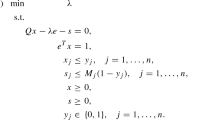Abstract
This paper considers mixed-integer quadratic programs in which the objective function is quadratic in the integer and in the continuous variables, and the constraints are linear in the variables of both types. The generalized Benders' decomposition is a suitable approach for solving such programs. However, the program does not become more tractable if this method is used, since Benders' cuts are quadratic in the integer variables. A new equivalent formulation that renders the program tractable is developed, under which the dual objective function is linear in the integer variables and the dual constraint set is independent of these variables. Benders' cuts that are derived from the new formulation are linear in the integer variables, and the original problem is decomposed into a series of integer linear master problems and standard quadratic subproblems. The new formulation does not introduce new primary variables or new constraints into the computational steps of the decomposition algorithm.
Similar content being viewed by others
References
R.D. Armstrong and C. E. Willis, “Simultaneous investment and allocation decisions applied to water planning”,Management Science 23 (1977) 1080–1087.
E. Balas, “Duality in discrete programming: II. The quadratic case”,Management Science 16 (1969) 14–32.
M.S. Bazaraa and H.D. Sherali, “Benders' partitioning scheme applied to a new formulation of the quadratic assignment problem”,Naval Research Logistics Quarterly 27 (1980) 29–41.
E.M.L. Beale, “On minimizing a convex function subject to linear inequalities”,Journal of the Royal Statistical Society (B) 17 (1955) 173–184.
A. Ben-Israel and T.N.E. Greville,Generalized inverses: Theory and applications (Wiley, New York, 1974).
J.F. Benders, “Partitioning procedures for solving mixed variable programming problems”,Numerische Mathematik 4 (1962) 238–252.
R.W. Cottle, “Symmetric dual quadratic programs”,Quarterly of Applied Mathematics 21 (1963) 237–243.
J.B. Dennis,Mathematical programming and electrical networks (Technology Press, Cambridge, MA, 1959).
W.S. Dorn, “Duality in quadratic programming”,Quarterly of Applied Mathematics 18 (1960) 155–162.
R.S. Garfinkel and G.L. Nemhauser,Integer programming (Wiley, New York, 1972).
A.M. Geoffrion, “Elements of large-scale mathematical programming”,Management Science 16 (1970) 652–691.
A.M. Geoffrion, “Generalized Benders' decomposition”,Journal of Optimization Theory and Applications 10 (1972) 237–260.
A.M. Geoffrion and G.W. Graves, “Multicommodity distribution system design by Benders' decomposition”,Management Science 20 (1974) 822–844.
A.M. Geoffrion and R.E. Marsten, “Integer programming: A framework and state-of-the-art survey”,Management Science 18 (1972) 465–491.
F. Glover, “A pseudo primal dual integer programming algorithm”,Journal of Research of the National Bureau of Standards 71B (1967) 187–195.
F. Glover, “Further reduction of zero–one polynomial programming problems to zero–one linear programming problems”,Operations Research 21 (1973) 156–161.
F. Glover and R.E. Woolsey, “Converting the 0–1 polynomial programming problem to a 0–1 linear program”,Operations Research 22 (1974) 180–182.
F. Glover, “Improved linear integer programming formulations of nonlinear integer problems”,Management Science 22 (1975) 445–460.
R.E. Gomory, “All-integer programming algorithm”, in: J.F. Muth and G.L. Thompson, eds.,Industrial scheduling (Prentice Hall, Englewood Cliffs, NJ, 1963).
P. Hansen, “Quadratic zero–one programming by implicit enumeration”, in: F.A. Lootsma, ed.,Numerical methods in nonlinear optimization (Academic Press, New York, 1972) pp. 265–278.
H.P. Kunzi and W. Oettli, “Integer quadratic programming”, in: R.L. Graves and P. Wolfe, eds.,Recent advances in mathematical programming (McGraw Hill, New York, (1963) pp. 303–308.
L.S. Lasdon,Optimization theory for large systems (The Macmillan Company, New York, 1970).
C.E. Lemke, “A method for solution of quadratic programs”,Management Science 8 (1962) 442–453.
J.C. Mao and B. A. Wallingford, “An extension of Lawler and Bell's method of discrete optimization with examples from capital budgeting”,Management Science 15 (1969) 851–860.
R.D. McBride and J. S. Yormark, “An implicit enumeration algorithm for quadratic integer programming”,Management Science 26 (1980) 282–296.
R. Penrose, “A generalized inverse for matrices”,Proceedings of the Cambridge Philosophical Society 51 (1955) 406–413.
L.G. Watters, “Reduction of integer polynomial problems to zero–one linear programming problems”,Operations Research 15 (1967) 1171–1174.
P. Wolfe, “The simplex method for quadratic programming”,Econometrica 27 (1959) 382–389.
Author information
Authors and Affiliations
Additional information
The author wishes to thank two anonymous referees for their helpful comments and suggestions for revising the paper.
Rights and permissions
About this article
Cite this article
Lazimy, R. Mixed-integer quadratic programming. Mathematical Programming 22, 332–349 (1982). https://doi.org/10.1007/BF01581047
Received:
Revised:
Issue Date:
DOI: https://doi.org/10.1007/BF01581047




